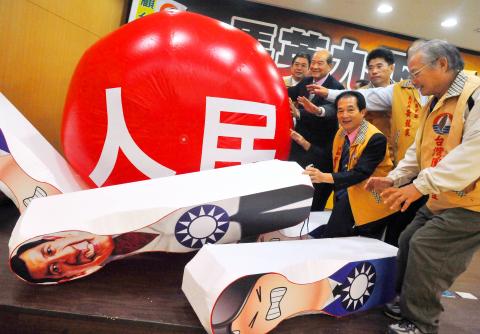The Taiwan Solidarity Union (TSU) yesterday launched a signature drive to recall President Ma Ying-jeou (馬英九), citing the nation’s deteriorating fiscal condition and what the party referred to as Ma’s incompetence.
“Taiwan cannot afford a president wasting another four years not doing anything,” TSU Chairman Huang Kun-huei (黃昆輝) told a press conference, calling on Taiwanese to help themselves by supporting the signature drive.
Democratic Progressive Party (DPP) Deputy Sectary-General Lin You-chang (林右昌), Taiwan Society president Wu Shu-min (吳樹民), former vice premier Wu Rong-i (吳榮義), Taiwan Nation Alliance (TNA) convener Yao Chia-wen (姚嘉文), former Academia Historica director Chang Yen-hsien (張炎憲) and representatives from pro-independence groups also attended the press conference.

Photo: AFP
Huang said that petition stations would be set up across the nation to collect signatures and the party would also establish a Web site allowing people to sign the petition online.
After it has collected signatures, the chairman said, the party would ask all district legislators whether they would obey “the people’s will or Ma’s opinions.”
By doing this the party aims to identify elected representatives who ignore the voice of the public and shield an incompetent government, Huang said.
He added that the party would gather all lawmakers’ performance records in the legislature and find out who had been supporting the government’s poor policies.
“Ma Ying-jeou has been so at ease just because some lawmakers support his interests over the public interest, and Ma and these lawmakers have therefore formed a conspiracy,” he said.
Huang added that the party would move to launch a recall of poorly performing lawmakers as a precursor to recalling Ma.
The chairman said the party plans to formally present the petition after Ma finishes the first year of his four-year second term on May 20 next year.

The disruption of 941 flights in and out of Taiwan due to China’s large-scale military exercises was no accident, but rather the result of a “quasi-blockade” used to simulate creating the air and sea routes needed for an amphibious landing, a military expert said. The disruptions occurred on Tuesday and lasted about 10 hours as China conducted live-fire drills in the Taiwan Strait. The Civil Aviation Administration (CAA) said the exercises affected 857 international flights and 84 domestic flights, affecting more than 100,000 travelers. Su Tzu-yun (蘇紫雲), a research fellow at the government-sponsored Institute for National Defense and Security Research, said the air

Taiwan is to commence mass production of the Tien Kung (天弓, “Sky Bow”) III, IV and V missiles by the second quarter of this year if the legislature approves the government’s NT$1.25 trillion (US$39.78 billion) special defense budget, an official said yesterday. Commenting on condition of anonymity, a defense official with knowledge of the matter said that the advanced systems are expected to provide crucial capabilities against ballistic and cruise missiles for the proposed “T-Dome,” an advanced, multi-layered air defense network. The Tien Kung III is an air defense missile with a maximum interception altitude of 35km. The Tien Kung IV and V

Trips for more than 100,000 international and domestic air travelers could be disrupted as China launches a military exercise around Taiwan today, Taiwan’s Civil Aviation Administration (CAA) said yesterday. The exercise could affect nearly 900 flights scheduled to enter the Taipei Flight Information Region (FIR) during the exercise window, it added. A notice issued by the Chinese Civil Aviation Administration showed there would be seven temporary zones around the Taiwan Strait which would be used for live-fire exercises, lasting from 8am to 6pm today. All aircraft are prohibited from entering during exercise, it says. Taipei FIR has 14 international air routes and

Taiwan lacks effective and cost-efficient armaments to intercept rockets, making the planned “T-Dome” interception system necessary, two experts said on Tuesday. The concerns were raised after China’s military fired two waves of rockets during live-fire drills around Taiwan on Tuesday, part of two-day exercises code-named “Justice Mission 2025.” The first wave involved 17 rockets launched at 9am from Pingtan in China’s Fujian Province, according to Lieutenant General Hsieh Jih-sheng (謝日升) of the Office of the Deputy Chief of the General Staff for Intelligence at the Ministry of National Defense. Those rockets landed 70 nautical miles (129.6km) northeast of Keelung without flying over Taiwan,